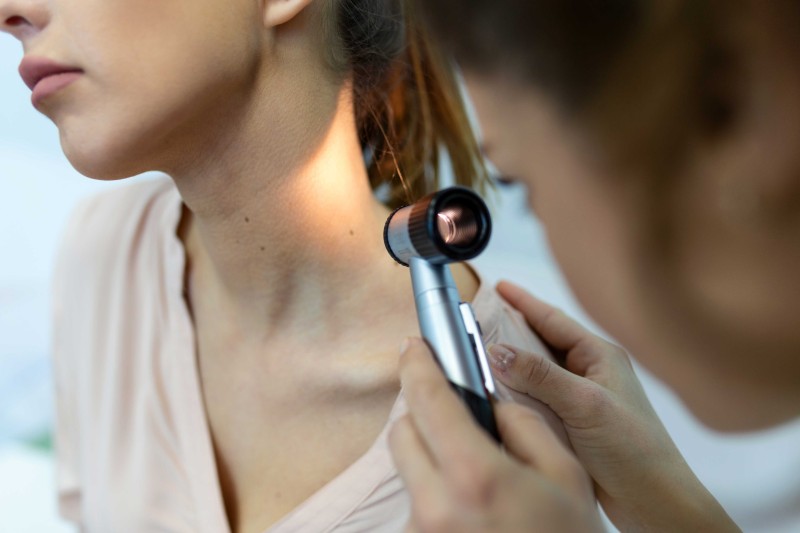Dermatology is one of the busiest outpatient specialties in England, with over half of all referred activity to dermatology services related to skin cancer.
Dorset has one of the highest incidence rates of skin cancer in the UK, with an incidence rate in people under 75 of 29.5 per 100,000 people, compared with an average of 18.4 in England.
An ageing population is of particular concern for dermatology services because the incidence in this patient group is high and often difficult to treat.
Another factor leading to a rise in skin cancer is the growing impact of ultraviolet light, an adverse environmental exposure that accompanies climate change.
Early diagnosis of cancer is key to effective management - however, the only detection method available is direct skin examination performed by a trained professional.
Examination by a consultant dermatologist is the gold standard, but there are severe workforce issues in dermatology services and a national shortfall of dermatologists. Currently within the UK, the ability to respond to the volume and challenges of skin cancer management is hampered by having the smallest number of dermatologists per patient in Europe.
Nurse-led approaches
In the UK, skin cancer clinics rely upon nursing experts to carry out key roles in supporting access to diagnostics, patient support and follow up services.
Nurse-led basal cell carcinoma clinic services have been shown to be efficient and cost-effective; the patient caseload and care delivered are equivalent to a medical consultant, yet the funding required is less.
With existing outpatient waiting lists, it is important to identify resource efficient nurse-led models for skin cancer within an outpatient setting. Such models must fulfil the need for rapid assessment and diagnosis to determine seriousness and risk, and then follow up support and health education.
Digital technology also offers great potential to help deliver effective dermatology services by reducing the number of people needing to attend hospital.
Nurse-led models are needed to support the rising demands for skin cancer and is the motivation for this PhD research, which has been match-funded by Bournemouth University and University Hospitals Dorset NHS Foundation Trust.
The principal investigator, PhD student Leila Kattach, also works as an advanced specialist dermatology nurse at University Hospitals Dorset.
The project will investigate the types and components of nurse-led models of service delivery in existence for patients requiring assessment and/or education for skin cancer, as a basis for co-creating a viable and desired nurse-led model of service delivery for skin cancer detection.
A systematic review has been conducted examining nurse-led models of service delivery for skin cancer detection globally, which is being finalised for publication.
The study will also used a mixed methods design to collect and analyse data:
The first phase will involve quantitative (numerical) and qualitative (textual) data collection through a purpose-built dermatology nurse questionnaire to investigate existing nurse-led models of care and nurses' perspectives and preferences for an ideal nurse-led model.
The data collected from this national nurse survey will span across the British Isles and across healthcare settings. There are regions within the British Isles that have limited access to dermatologists, and we aim to also capture their needs within the design of the model.
The second and subsequent phase will use focus groups to explore and explain the initial findings and any unexpected results.
The focus group discussions will be conducted with services users and dermatology experts (doctors and nurses) within Dorset and nationally to encourage the data to be representative of the population requiring skin cancer care, as well as dermatology service needs nationally.
The discussions will include an appraisal of different components of a nurse-led model (informed by outcomes of the systematic review and dermatology nurse questionnaire) to reach a ‘consensus’ among service users and experts regarding the design of the novel nurse-led model.
The study results are planned to be shared by the end of 2026.
Improving skin cancer care
The project aims to develop a new nurse-led model to improve how skin cancer care is provided within the NHS. This model will be transferable to different NHS Trusts and benefit both patients with skin cancer and individuals who require assessment of one or more skin lesions (an area of the skin that is different to the surrounding skin, and may be a skin cancer).
The project aims to investigate the types and components of nurse-led models of service delivery in existence for patients requiring assessment and/or education for skin cancer, as a basis for co-creating a viable and desired nurse-led model of service delivery for skin cancer detection. The nurse-led model is intended for implementation within the NHS.
The uniqueness of this model lies in its co-creation process, involving input from a patient and public involvement advisory group, service users of national skin cancer services, and expert dermatology doctors and nurses. This collaborative effort ensures that considerations for feasibility, acceptability, and safety are thoroughly integrated into the design.
After completing the PhD research project (the co-creation of a novel nurse-led model of service delivery for skin cancer detection), a post-doctoral study is planned to evaluate the effectiveness of the model once implemented within an NHS dermatology service.
Get involved
If you would like to get involved in this PhD research, then please contact the principal investigator Leila Kattach at: [email protected].
We will soon be looking to recruit participants that meet the following requirements:
- Registered dermatology nurses conducting one or more different nurse-led models of care for skin cancer
- Service users that have lived experience of being referred into dermatology on a fast-track referral pathway for the assessment of a one or more skin lesion suspicious of skin cancer. The skin lesion may or may not have been diagnosed as skin cancer
